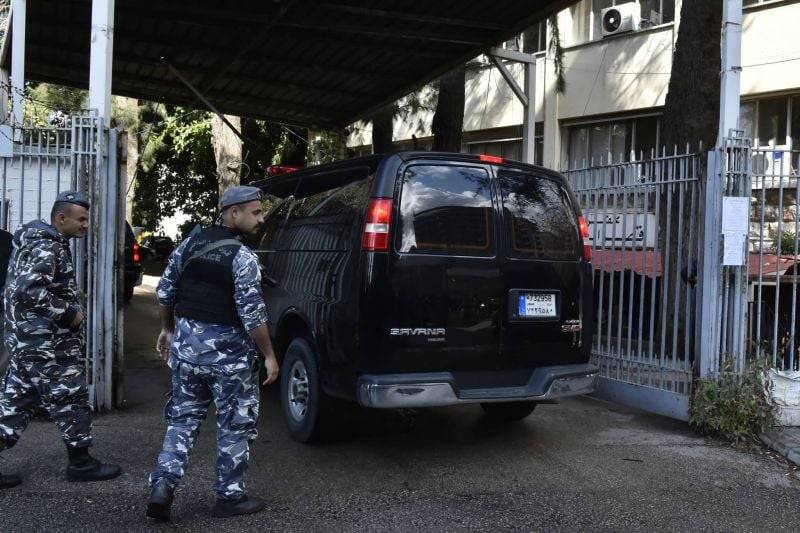
The scene at Beirut’s Justice Palace, 16 March, during questioning concerning the EU investigation into the Salameh case. (Credit: Houssam Chbaro)
The first investigating judge in Beirut, Charbel Abu Samra, has scheduled a hearing for Thursday, April 6, as part of the ongoing investigation into allegations of “bribery, forgery, money laundering, illicit enrichment, and tax evasion” against the Banque du Liban Governor Riad Salameh.
These charges were brought forth by the Deputy Prosecutor at the Court of Appeals, Raja Hamoush, who initiated proceedings against Salame on Feb. 23, 2023, before the case was referred to Judge Abu Samra.
An informed judicial source, who spoke to L’Orient-Le Jour on condition of anonymity given the sensitivity of the issue, said Salameh has not been summoned to Thursday’s scheduled session, because it will touch on the exceptions put forth last Tuesday by his lawyer Hafez Zakhour, who questioned the soundness of the complaint filed by Helene Iskandar, the head of the Justice Minister’s litigation department.
Iskandar lodged her complaint after sending a request to caretaker Finance Minister Youssef Khalil to join her grievance to the case that is being investigated by Judge Abu Samra, stressing “the need to preserve the rights of the state,” should the Lebanese judiciary be able to confiscate assets in the framework of the case.
In her request letter, Iskandar informed Khalil that should he fail to respond by March 15, she would consider his silence to be tacit consent, especially since he had not previously responded to two similar requests she had made.
Khalil has yet to respond to the judge’s request, according to a judicial source.
Does silence mean approval?
According to a source close to Salameh’s lawyer, silence does not mean approval in legal terms.
The source explained to L’Orient-Le Jour that the prior approval of the finance minister and that of Justice Minister Henry Khoury, or both, is “essential” for the state’s litigation department to file a complaint in this regard.
The same source referred to a study of the department of consultations and legislation, chaired by the justice minister’s wife, Judge Joelle Fawaz, according to which “a lawyer cannot file a complaint without their client’s authorization.”
In this case, the Justice Ministry’s litigation department acts as the attorney of the state, which is represented by the ministers of finance and justice.
“This prompts the question,” said the source, who is close to Salameh’s lawyer. “How could the state’s lawyer file a complaint without its client’s approval?”
During the March 16 hearing held by Judge Abu Samra to execute the letters rogatory of several European countries, including France, Belgium, Germany, and Luxembourg, which are looking into alleged “money laundering,” Salameh objected to Iskandar’s presence in the courtroom.
Iskandar joined the civil party in the European investigation, despite not obtaining approval from both the justice and finance ministers.
However, after consulting with the French investigating judge, Aude Buresi, who was present at the hearing, Abu Samra dismissed Salameh’s objections, deeming that Iskandar had the right to attend the hearing.
According to sources close to Salameh’s defense team, Iskandar has yet to respond to the procedural objections.
Meanwhile, a judicial source told L’Orient-Le Jour Iskandar has not yet been officially notified.
As per standard procedure, once she receives the notification, Iskandar will need to submit her response to Judge Abu Samra, who will then seek the non-binding opinion of the general prosecutor.
The first investigating judge’s decision regarding Salameh’s request will determine whether Iskandar has the right to file a complaint against Salameh before the Lebanese courts [in the framework of the European investigation].
In case of an unfavorable decision, the aggrieved party will have 24 hours to appeal Abu Samra’s ruling to the indictment chamber, which will remain to be seen in the hearing scheduled for Thursday.
Technical experts
The first investigating judge is currently collaborating with several accounting and financial auditing experts to comprehend the technical aspects of the case and interrogate Salameh, according to a judicial source who spoke to L’Orient-Le Jour.
Abu Samra has not yet assigned them any tasks, which suggests a possible delay in the interrogation.
Salameh has repeatedly denied any wrongdoing. During the March 16 hearing held as part of the European investigation, the governor dismissed “any suspicion of money laundering,” AFP reported at the time, citing a reliable source.
While he affirmed his willingness to comply with legal procedures, Salameh also asserted his innocence on Febr. 23, telling Reuters that the accusations against him did not amount to “an indictment.”
This story originally ran in French in L’Orient-Le Jour, translated by Sahar Ghousoub.